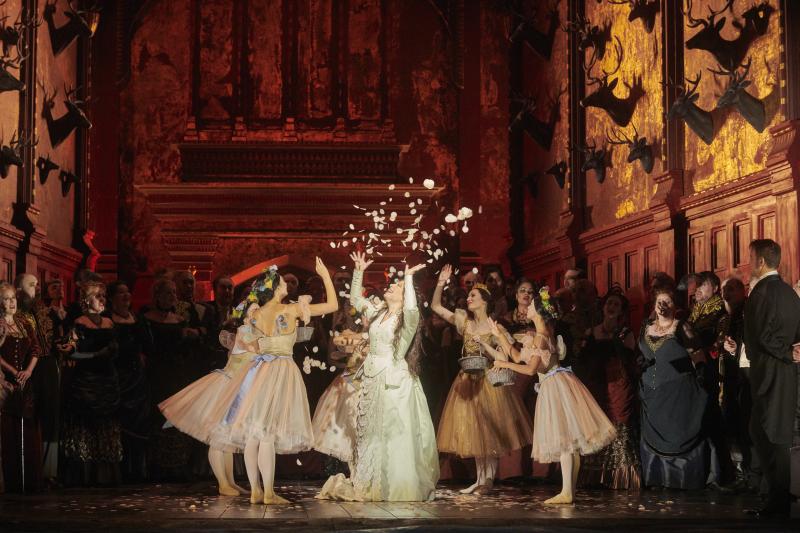Review: RUSALKA is a Shining Example of a Dark Fairy-Tale Opera Done Right

The Canadian Opera Company's RUSALKA utilizes Lyric Opera's 2014 production under the direction of Sir David McVicar, making his COC debut. This retelling of Hans Christian Andersen's 'The Little Mermaid' draws on a more sinister angle of the folk tale than what most people might know, utilizing composer Antonín Dvořák's multi-faceted score to convey emotion and fantasy at the leadership of conductor Johannes Debus.
As the story opens, the wood nymphs (Anna-Sophie Neher, Jamie Groote, Lauren Segal) are introduced as a crude bunch who fear the Water Goblin Vodník (Štefan Kocán) enough to avoid him but not enough to go without taunting him. After an uncomfortable scene full of attempted kidnapping and harassment, the nymphs flee and Rusalka (Sondra Radvanovsky) appears to plead with the Goblin-her father-to live as a human, as she's fallen in love with a prince (Pavel Cernoch) who swims in her pond. He sends her to Ježibaba (Elena Manistina), the witch, who gives her a human form and spirit in exchange for her voice, but it's dependent on his faithfulness to her to prevent the spell from turning into a curse. It doesn't take long for the prince to arrive, find Rusalka, and bring her back to his palace to marry her, but Rusalka struggles to fit in with the humans and is threatened by a foreign princess (Keri Alkema) who wants to marry the prince herself.
Radvanovsky is sublime as the central character; her pristine soprano is both delicate and powerful, making her "Song to the Moon" dreamlike. While she spends most of act two silent, Radvanovsky is a detailed physical actor and sells the many complex emotions Rusalka feels within the palace; a highlight of the evening is her unbridled curiosity at the ball, believing the ballerinas to be the same as the wood nymphs she lived alongside.
Manistina's Ježibaba is equal parts menacing and comical, whether she appears from her home looking like a sophisticated governess or a messy butcher. Cernoch's voice carries a rich tone that fits this textbook, flippant prince perfectly. Appearing throughout the story to sympathize and/or curse his daughter, Kocán's Vodník is a lurking figure with a soulful bass tone that seems to seep across settings and through scenes throughout the opera.
The story itself depends on fairy-tale scenery (set design by John MacFarlane), which is done in spades and with a twist. As gorgeous as Rusalka's home is, it's still a swampy pond adjacent to a drainpipe. The great hall of the palace is all tall ceilings and large fireplaces, but the dozens of deer heads mounted and deep orange-red lighting (lighting design by David Finn) make it foreboding. In fact, deer imagery and references are scattered throughout the three-act opera; the prince first finds Rusalka on a deer hunt and he often refers to her as a white doe. This, coupled with Rusalka's connection to the deer mounted in the palace seen through her several attempts to climb up and touch them, seems to be McVicar's way of taking the objectification of Rusalka and turning it into a physical component of the story. She is a magical creature, rare like a white doe, and try as the prince might he can't subdue or control her like his prized game trophies.
Each component that goes into this RUSALKA leads to a musically solid and visually dynamic production. It goes beyond the realm of a fairy-tale opera and into the territory of artwork. Debus leads a skilled orchestra with great attention to detail, sets are interchanged and adjusted constantly to create a world that feels real, and the actors and singers onstage balance demanding physical acting with a pitch-perfect performance. RUSALKA is at its core a twisted, enchanting work that will have you questioning humanity, love, betrayal, and just how exactly Radvanovsky can sound so powerful while laying wrapped around a tree branch.
The Canadian Opera Company's RUSALKA runs through October 26 at the Four Seasons Centre for the Performing Arts, 145 Queen St W, Toronto, ON.
For more information or to purchase tickets, visit https://www.coc.ca/productions/18705
Photo credit: Chris Hutcheson
Videos

